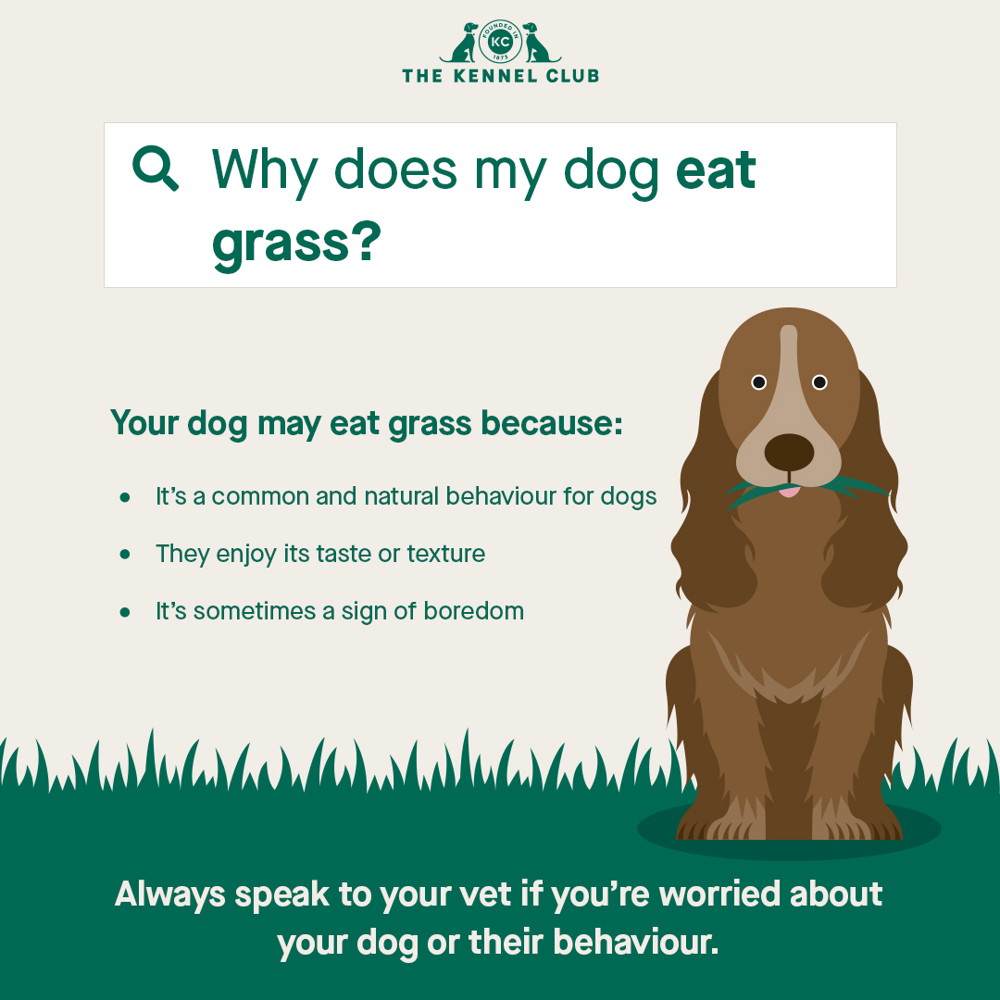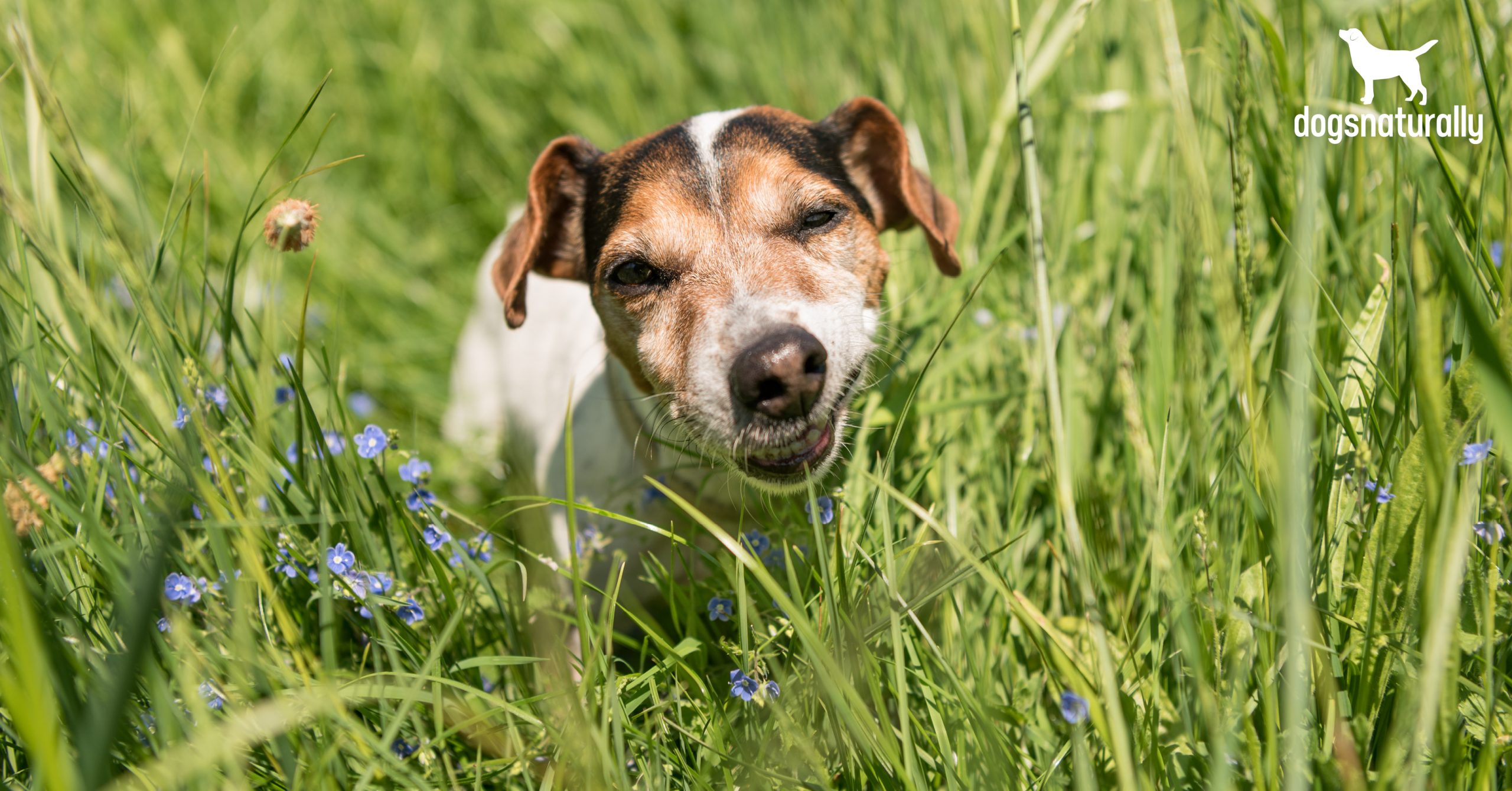Dogs eating grass is a common behavior of canines, but should you let your dog eat grass? Many pet owners wonder what the benefits and risks are of allowing their dog to consume grass, and if it’s safe for their pet. This blog post will explore both the pros and cons of dogs eating grass and give you the information you need to make an informed decision about whether or not to let your dog eat grass.

Should I Stop My Dog from Eating Grass?
No, eating grass is considered to be a normal behavior for a dog. It can be a natural way for a dog to purge an upset stomach or to add fiber to its diet. However, it is important to be aware of the type of grass that your dog is eating.
Some grasses may contain toxins or chemicals that could be harmful to your dog. If you are concerned that your dog may be eating something dangerous, then it is best to let your vet know and take your dog in for a checkup. If the grass is safe, then there’s no need to stop your dog from eating it.

Why Does My Dog Eat Grass?
Eating grass is a common behavior in dogs, but why do they do it? Some experts believe that it’s a way for dogs to make up for a dietary deficiency, while others think that it’s simply a way to soothe an upset stomach.
If your dog eats grass, it’s likely not a cause for concern, unless they’re eating large amounts of it or they’re throwing up afterward. If you’re concerned, it’s best to talk to your vet to make sure that your pup is healthy and that their diet is providing them with the nutrients they need.
Diet Deficiency
Dogs may eat grass due to a lack of certain vitamins and minerals in their diet, or to ease an upset stomach. If you suspect that your dog may be eating grass due to a diet deficiency, you should consult your veterinarian and adjust the diet accordingly. Supplementing a dog’s diet with vitamins and minerals can help to prevent the need to eat grass, and ensure that your dog is receiving the proper nutrition.
Need for Fiber
The grass may provide a source of much-needed fiber in your dog’s diet. Fiber helps keep your dog’s digestive system healthy and regular. If your dog’s regular diet is lacking in fiber, the grass can be a helpful supplement.
Antacid
It is a common behavior for dogs to eat grass, much like cats that like to nibble on plants. The grass is not typically harmful to dogs, and there are even some health benefits associated with it. For example, eating grass can help a dog with an upset stomach, as the grass can act as an antacid.
Boredom
If your dog is eating grass because they are bored, it is a good idea to try and provide them with more stimulating activities. Take them for longer walks, provide them with more interactive toys, and make sure they get plenty of mental and physical exercise.
If your dog is still eating grass out of boredom, it is important to consult your veterinarian to make sure there is not an underlying medical issue causing them to eat the grass.
Tasty Treats
The dog may eat grass as their tasty treat. While some dogs may simply enjoy the taste or texture of grass, others may eat it to help settle their stomach. It is important to note, however, that grass should not replace a balanced diet. Eating large amounts of grass can cause your dog to vomit, so it is important to monitor your dog’s grass-eating habits and only allow him to have a small amount.
Pros:
Letting your dog eat grass can have some benefits:
- The grass is packed with nutrients that can help with digestion and keep your dog’s coat healthy.
- Eating grass can also help your dog get rid of parasites such as worms, and it may even help them expel toxins.
- Eating grass may also help to keep your dog’s teeth clean, as the fibrous blades can act as a natural toothbrush.
- Additionally, many dogs simply enjoy grazing on grass, and it can be a great way for them to get some mental stimulation.
Cons:
However, there are some potential downsides to letting your dog eat grass:
- Eating grass can lead to vomiting or digestive upset, as some dogs may not be used to consuming the fibrous material.
- Additionally, there is always the potential for your dog to ingest parasites, pesticides, or other chemicals that may be present in the grass.
If you allow your dog to eat grass, be sure that it comes from a safe, pesticide-free area.
Is Eating Grass Bad for Dogs?

The short answer is that it’s generally not bad for dogs to eat grass, but it depends on the type of grass and how much your dog is eating. Some types of grass can be toxic or cause gastrointestinal distress if ingested in large quantities.
It is important to monitor your dog’s grass consumption and make sure that any grass they eat is free of harmful chemicals, pesticides, or other toxins. If you notice any negative side effects, it is best to discontinue letting your dog eat grass and speak with your veterinarian.
How to Stop Your Dog from Eating Grass
If your dog eats grass, there are a few steps that you can take to help decrease its consumption. Firstly, make sure that your dog is getting enough of their required nutrients. If they are not getting enough of the right vitamins and minerals, they may be eating grass to supplement their diet.
Additionally, you may want to try providing your dog with a distraction, such as a chew toy or interactive game, when they start to eat grass.
Finally, if you think that your dog is eating grass out of boredom or anxiety, you may need to look into ways to reduce their stress levels, such as providing them with more exercise or taking them for regular walks.
Why Do Dogs Eat Grass and Vomit?
Dogs eating grass is a common behavior and it can be perfectly normal. Some believe that dogs eat grass to soothe an upset stomach, while others think they do it just because they like the taste. Although it can be perfectly normal, it is important to be aware of the potential risks of your dog eating grass.
Eating grass can cause your dog to vomit, which can lead to dehydration and other health issues. If your dog is frequently eating grass and vomiting, it may be a sign of an underlying health problem, so it is important to consult your veterinarian.
If your dog is simply eating grass as a treat, then it is generally not a concern. However, it is important to ensure that the grass is free from pesticides, herbicides, and other potentially dangerous chemicals.
Steps to Take If Your Dog Keeps Eating Grass and Throwing Up
If your dog keeps eating grass and throwing up, it is important to take the right steps to ensure its health and safety. First and foremost, it is important to take your dog to the vet to ensure there is no underlying medical condition causing the behavior. If the vet clears your dog, then it is important to identify why your dog is eating grass.
This could be due to boredom, lack of nutrients, or an undiagnosed digestive issue. Once the cause has been identified, then steps can be taken to remedy the problem such as providing more stimulation, changing the diet, or providing supplements. Finally, it is important to monitor your dog and ensure they are not ingesting any potentially harmful plants or toxins.
Why Do Dogs Eat Grass and Poop?
Dog-eating grass and poop is a common behavior for many dogs. It is usually not a sign of a medical issue, but rather a behavioral habit that can be difficult to break. While it may seem strange, dogs typically eat grass and poop because they like the taste and texture.
If you’re concerned about your dog’s behavior, it’s best to consult your veterinarian to ensure there is not a medical issue.
Why is my Dog Desperate to Eat Grass?
if your dog is desperate to eat grass, there are several possible reasons. It could be that your dog is bored and the grass is something new and interesting to chew on. It could also be that your dog is lacking certain nutrients in their diet, so they are trying to make up for it by eating grass. Whatever the reason, it is generally safe for dogs to eat grass in moderation.
What Can I Give My Dog Instead of him Eating Grass?
If you’re worried about your pet eating grass, there are plenty of options to offer them as an alternative. You can provide them with a variety of healthy chew toys or treats, such as carrots, apples, or bananas.
You can also try giving them some cooked veggies or a frozen Kong toy stuffed with peanut butter. If your dog is an outdoor animal, you can also try introducing them to activities like fetch or agility courses to keep them entertained and distracted from the grass.
Conclusion
In conclusion, there is no definitive answer as to whether or not you should let your dog eat grass. Ultimately, the decision should be left up to the pet owner’s discretion. If the grass is free of any potential toxins and your dog seems to enjoy it, then it may be safe to let them eat it. However, if there is a risk of toxic substances in the grass, it is best to keep your pet away from it. Additionally, if your dog has any digestive issues or is prone to vomiting, it is best to avoid grass altogether.

